
As our population grows older, we continue to learn more about how to extend the duration of human life while at the same time improving its quality.
Just recently, a study published in the respected journal Nature Aging announced that we age significantly in two sudden bursts in life – at the age of 44 and 60. However, along with that, the researchers talked about how to slow down these aging waves.
Among the advice they gave us were standard ideas like eating healthy, doing strength exercises, and regular health checks. Some other factors contributing to growing old gracefully can be keeping an active social life and being mentally stimulated.
No matter what we do, though, there may come a moment when we become dependent on others for more and more things in our lives. At that period of our lives, psychologists, geriatric specialists, and scientists agree that we should be surrounded by family and people we love.
Simultaneously, seniors who are dependent on others for a large part of their daily activities typically also need specialized or professional care. Prestigious senior care organizations like Amy’s Eden Senior Care offer such senior home care services.
In this article, you’ll learn everything you need to know about 24-hour home care:
- what it encompasses and who performs it;
- who it is for, and does your loved one need it;
- options for funding it, and
- how to choose the best home care provider.
Caring for a loved one can and should be a shared responsibility.
Types of Senior Home Care Services
Home care for seniors comes in various forms, each catering to different needs. Some types of home care can be available on a 24-hour basis, while others may offer only part-time support.
| Service | Assistance provided | 24-hour availability | Who provides it |
|---|---|---|---|
| Personal Care Assistance | Help with daily activities such as bathing, dressing, grooming, toileting, and mobility. | Yes, if needed. | Personal care aides or home health aides. |
| Homemaker Services | Assistance with household tasks like cleaning, laundry, cooking, and grocery shopping. | Typically not 24/7; usually part-time or scheduled at specific times. | Homemakers or domestic aides. |
| Companion Care | Social interaction, accompaniment to appointments, help with hobbies, and general companionship. | Yes, some services provide live-in companions or shift-based care for 24/7 coverage. | Companion caregivers or aides. |
| Skilled Nursing Care | Medical care, such as administering medications, wound care, or managing chronic conditions. | Yes, skilled nursing care can be provided around the clock. | Registered nurses (RNs) or licensed practical nurses (LPNs). |
| Therapy Services (Physical, Occupational, Speech) | Rehabilitation for mobility, strength, communication, and daily functioning. | No, these services are usually scheduled for specific therapy sessions. | Licensed therapists. |
| Respite Care | Temporary relief for family caregivers, where professional caregivers take over for a short period. | Yes, respite care can be arranged for a 24-hour, but only on a short-term basis. | Professional caregivers or home health aides. |
| Live-In Care | Around-the-clock assistance with personal care, household tasks, and companionship. | Yes, caregivers live in the home to provide continuous support. | Live-in caregivers or aides (with shift or relief breaks). |
| Dementia and Alzheimer’s Care | Specialized care for seniors with cognitive impairments, focusing on safety, emotional support, and memory care. | Yes, care can be provided continuously to ensure safety and well-being. | Caregivers trained in dementia care. |
| Palliative and Hospice Care | Comfort care for those with terminal illnesses, focusing on pain relief, symptom management, and emotional support. | Yes, hospice and palliative care teams can provide 24/7 care. | A team of doctors, nurses, social workers, and volunteers. |
What is 24-Hour Home Care for Seniors
24-hour home care refers to continuous, round-the-clock assistance provided to seniors in their own homes, or wherever they call home. It ensures that trained caregivers are available at all times, day and night, to assist with personal care, medical needs, and household tasks.
This type of care is usually required for seniors with complex medical conditions, cognitive impairments, or severe mobility limitations, ensuring their safety, comfort, and well-being.
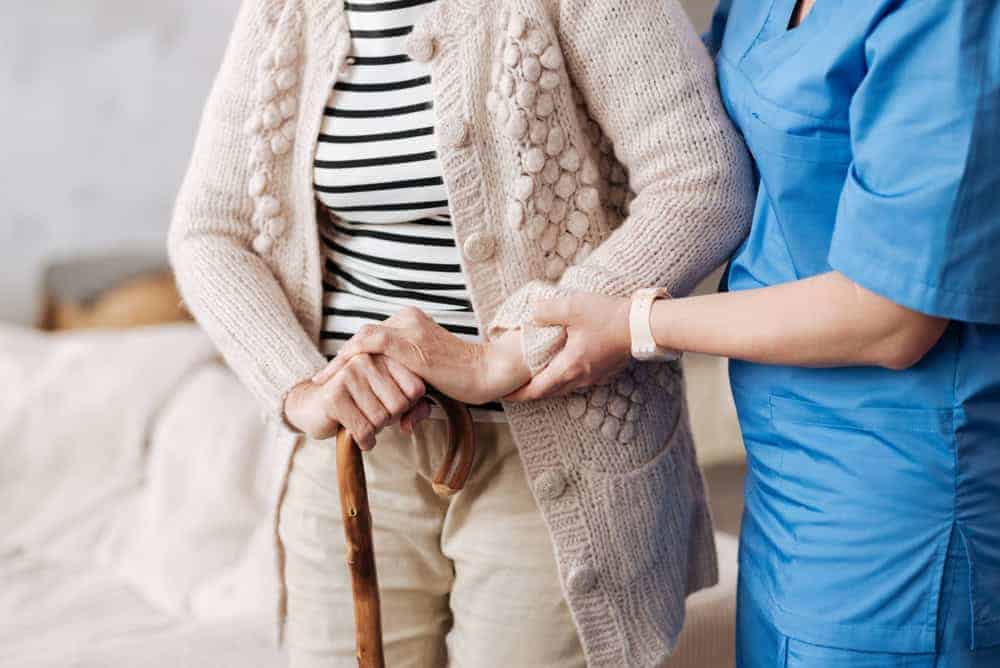
24-hour care is often necessary for seniors with high care needs or those with conditions like dementia. Live-in care, personal care assistance, skilled nursing, and hospice care are typically the types of senior care services available 24/7.
The continuous care can be provided either by:
- Live-in Caregivers: One or more caregivers stay in your beloved senior’s home and are available around the clock, though they may take breaks and rest during the day or night.
- Shift Care: Different caregivers work in shifts (typically 8 or 12-hour shifts) to provide continuous coverage without interruptions.
Does Your Loved One Need 24-hour Home Care?
Seniors who require 24-hour home care generally have complex or intensive care needs. We have compiled a list of some common situations in which elderly individuals may need continuous, round-the-clock care.
Advanced Dementia or Alzheimer’s Disease
Seniors with advanced dementia or Alzheimer’s often experience memory loss, confusion, and disorientation. They may wander, get lost, or be unable to perform daily tasks without constant supervision. Round-the-clock home care ensures their safety and helps manage their behavioral changes.
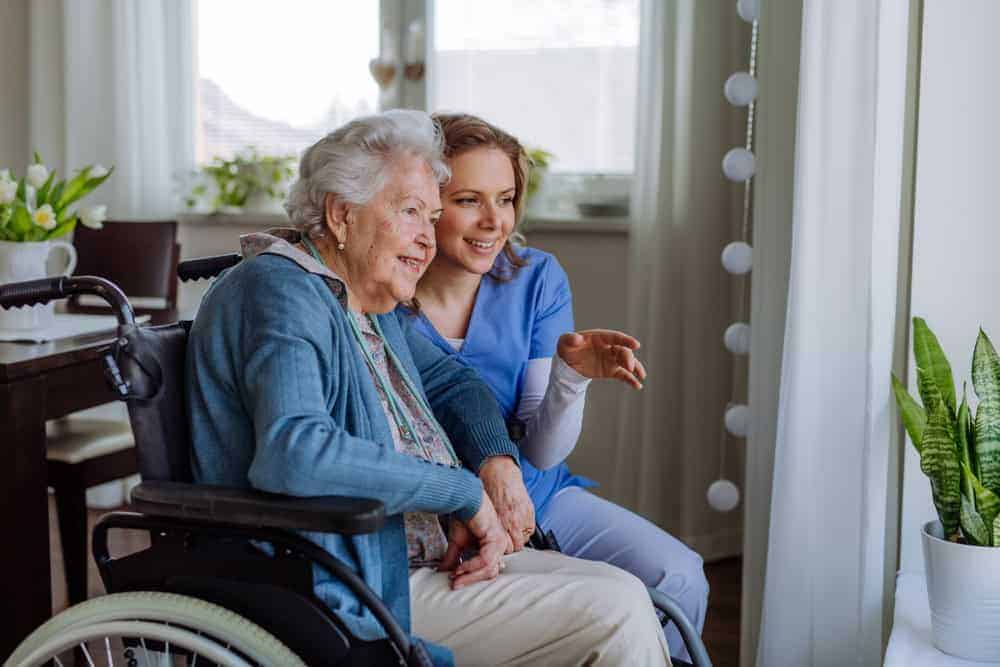
Mobility Issues or Fall Risk
If your loved one has mobility limitations, such as they are wheelchair-bound, bedridden, or having balance issues, they are at high risk of falling. They may require 24-hour assistance to move around safely, transfer between beds or chairs, and perform basic tasks.
Chronic or Severe Medical Conditions
Conditions like heart disease, diabetes, COPD, or cancer often require continuous monitoring, medication management, or frequent medical interventions. 24-hour care allows a professional to be available to address emergencies or manage your beloved’s condition at all times.
Post-surgery or Hospitalization Recovery
After major surgery, many seniors need help with wound care, mobility, medication, and personal hygiene. Continuous care helps prevent complications and supports their recovery, especially in the early stages.
Stroke Recovery
If your loved one is recovering from a stroke, they may have mobility, speech, or cognitive impairments. 24-hour home care will ensure they receive assistance with rehabilitation exercises, daily activities, and managing any ongoing health issues caused by the stroke.
Terminal Illness (Palliative or Hospice Care)
Seniors with terminal illnesses may need palliative or hospice care to manage pain and symptoms in the final stages of life. 24-hour care provides comfort, dignity, and emotional support in the comfort of their home while ensuring their medical needs are met.
Incontinence or Feeding Issues
Seniors who suffer from incontinence or have trouble swallowing may need assistance with toileting, hygiene, or feeding throughout the day and night. Continuous 24-hour care can help prevent health complications like infections, malnutrition, or dehydration.
Cognitive Impairments (Beyond Dementia)
Conditions such as traumatic brain injury (TBI) or advanced stages of Parkinson’s disease can lead to cognitive or motor difficulties. These seniors may need 24-hour supervision to ensure safety, medication intake, and help with their daily routines.

Severe Anxiety, Depression, or Mental Health Issues
If your beloved senior struggles with severe mental health issues, such as depression, anxiety, or paranoia, they may need constant companionship, supervision, or emotional support to ensure their safety and well-being.
Complex Medication Regimens
Seniors with complex medication schedules or those who require injections, IV therapy, or oxygen might benefit from 24-hour care to ensure medications are administered correctly and on time, preventing undesired reactions or missed doses.
End-of-Life Care
At the end of life, older adults may need continuous care to manage chronic pain, provide comfort, and assist with emotional or spiritual needs, especially in the final stages.
In all of these situations, having 24-hour home care will help provide peace of mind to the whole family and ensure that the senior receives the support, supervision, and medical care they need at any time of the day or night for the best quality of life possible.
A Detailed Look at 24-Hour Home Care for Seniors
The scope of 24-hour home care is a wide range of services tailored to meet the unique needs of your beloved senior. These may include:
1. Personal Care
- Assistance with bathing, dressing, grooming, and toileting.
- Help with mobility, such as moving in and out of bed or using assistive devices around the house.
- Incontinence care and support with personal hygiene.
2. Companionship and Emotional Support
- Providing companionship to reduce feelings of loneliness and isolation.
- Engaging in activities, conversations, and hobbies to stimulate mental well-being.
- Emotional support for seniors dealing with depression, anxiety, or other mental health challenges.
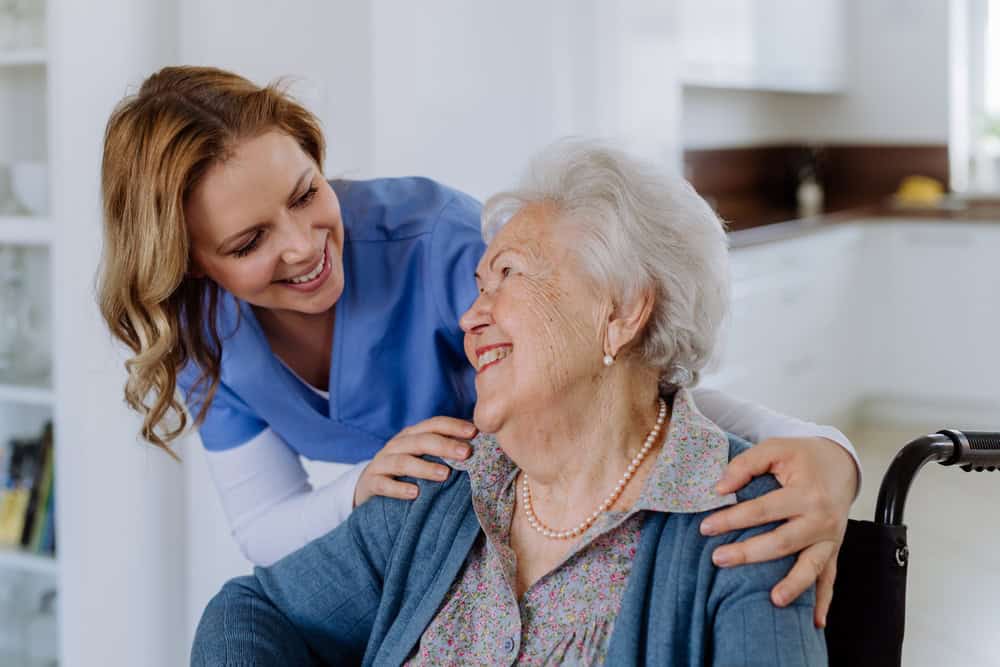
3. Medication Management
- Ensuring medications are taken on time and in the correct doses.
- Monitoring for side effects or adverse reactions.
- Administering medications, injections, or managing oxygen therapy as needed.
4. Meal Preparation and Feeding
- Preparing nutritious meals based on senior’s dietary restrictions or preferences.
- Assisting with feeding for seniors with swallowing difficulties or other issues.
- Monitoring food and water consumption to prevent dehydration or malnutrition.
5. Household Assistance
- Light housekeeping, such as cleaning, laundry, and maintaining a safe environment.
- Grocery shopping, running errands, and managing household supplies.
- Ensuring the home is free from hazards to prevent falls or accidents.
6. Medical and Health Support
- Monitoring your loved one’s vital signs, such as blood pressure, heart rate, and blood sugar levels.
- Wound care, catheter management, or IV administration.
- Coordinating with healthcare professionals and providing updates to doctors or family members.
7. Mobility and Transfer Assistance
- Helping seniors move around the home safely, including transfers from bed to wheelchair or from chair to bathroom.
- Accompanying and transporting your beloved to errands and appointments as needed.
- Preventing falls by providing steady assistance and support with walking.
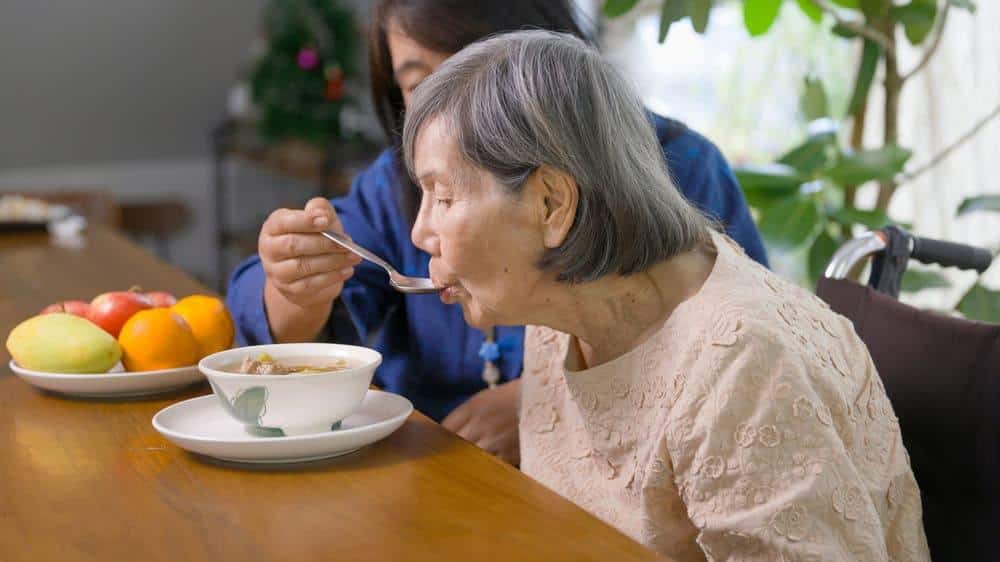
8. Nighttime Care
- Ensuring the senior is comfortable and safe through the night.
- Assisting with bathroom trips, repositioning in bed, and managing sleep disturbances.
- Monitoring for emergencies or health issues that might arise during the night.
9. Safety and Supervision
- Providing 24-hour supervision for seniors with cognitive impairments, such as Alzheimer’s or dementia, to prevent wandering or self-harm.
- Assisting with the use of safety equipment, such as alarms, bed rails, or monitoring systems.
10. End-of-Life Care (Palliative and Hospice)
- Offering comfort care and pain management for seniors nearing the end of life.
- Providing emotional and spiritual support to both the aging adult and their family.
- Assisting with all daily needs while prioritizing quality of life and dignity.
Who Provides 24-Hour Home Care?
A team of professionals that provide 24hrs home care may include:
- Personal Care Aides: For assistance with daily activities and companionship.
- Home Health Aides: For personal care, basic medical tasks, and household help.
- Certified Nursing Assistants (CNAs): For more specialized medical support and personal care.
- Registered Nurses (RNs) and Licensed Practical Nurses (LPNs): For skilled nursing services such as administering medications, wound care, and monitoring medical conditions.
Benefits of 24-Hour Home Care
24-hour home care for seniors offers a lot of advantages by contributing to a better quality of life, safety, and emotional well-being of your loved one.
Customized Support and Flexibility
Seniors get care plans designed especially for them, meeting their specific needs and health conditions. Whether they need help with daily tasks, moving around, or medical care, the care is made to fit their needs.
Additionally, the care plan can be changed over time as the senior’s condition changes, so the care stays right for their current health.
Supervision, Assistance, and Quick Response
Seniors with mobility issues or memory problems need assistance walking, getting out of bed, and moving around safely, but they also have a higher risk of falling. A 24 hour caregiver can keep an eye on them to prevent accidents, and if there’s a medical emergency, like a fall or stroke, they can respond immediately, which may save lives.
Staying in Their Own Home and Keeping the Routine
Most seniors prefer to live in the comfort of their homes instead of moving to a care facility. With 24-hour care, they can stay in a familiar environment, which can improve their emotional and mental health. Caregivers will help your beloved maintain their daily routine, like mealtimes and hobbies, maintaining a sense of normalcy and independence.
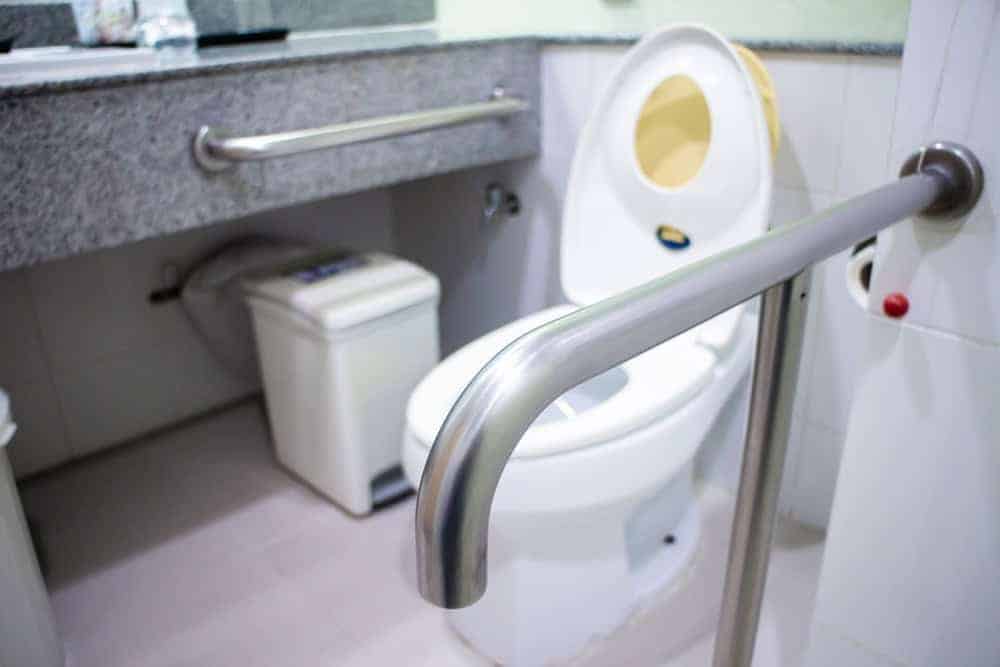
Reducing Loneliness
Seniors who live alone often feel lonely. Having a caregiver around means they can have companionship, engage in conversations, and play games, helping them stay mentally active.
The 24/7 presence of a caregiver can also provide a sense of safety and support to aging adults. This can be especially helpful for those dealing with anxiety, depression, or dementia.
Less Stress and More Confidence for Family Caregivers
With their numerous responsibilities, family members may often feel tired or overwhelmed when providing continuous care for a loved one. Professional caregivers can offer families relief from constant care, eliminating this pressure.
Admittedly, family members would feel much more at ease knowing that their loved one is getting the best care possible, especially if they have special health needs like dementia or chronic illnesses.
Regular Health Checks, Prevention, and Coordination
With 24 hour care, your beloved senior’s health will be constantly monitored – their vital signs checked, new symptoms noticed, and medication intake ensured. A skilled caregiver can notice signs of problems, like infections or dehydration, and take action before things get worse.
Additionally, caregivers typically work with the senior’s healthcare providers, helping to follow medical advice and keep track of appointments.
Help with Daily Tasks (ADLs) and Household Chores (IADLs)
It is difficult to maintain hygiene if you are experiencing problems with mobility or cognitive impairment. Independent people often overlook this fact, but caregivers can assist with essential tasks like bathing, dressing, and using the bathroom.
Caregivers can handle light cleaning, laundry, and meal preparation, keeping the home safe and comfortable. Caregivers prepare nutritious meals that meet the senior’s dietary needs, helping to prevent malnutrition. They can also help with feeding if needed.

Encouraging Independence
With patience and support, home caregivers encourage seniors to do things on their own whenever possible. This can help your loved one feel more independent. Moreover, staying involved in hobbies and social activities, like gardening or reading, can boost senior’s mood and mental health.
Managing Illnesses
Many seniors live with chronic conditions like diabetes, heart disease, or dementia. Caregivers are trained to manage these conditions and follow healthcare plans. Seniors with memory problems need special care. Caregivers can help manage their behavior, provide memory support, and make sure they stay safe.
Help During the Night
Some seniors have trouble sleeping or experience confusion at night — sundowning. A caregiver can provide comfort, help with bathroom trips, and ensure safety during the night. Health problems, such as falls or breathing issues, can get worse or sometimes happen at night. Caregivers are there to provide immediate help, which gives everyone peace of mind.
End-of-Life Care
For seniors nearing the end of life, 24 hour care provides the support they need to manage pain and emotional distress, helping them stay comfortable and keep their dignity. Professional caregivers also offer emotional and practical support to family members during this difficult time.
How to Choose the Right 24 hour Home Care
Choosing the right 24 hour care provider for a senior loved one is a decision that will affect their health, safety, and overall quality of life. It is a good idea to consider several factors before determining whether a particular care provider fits their needs.
1. Understand What Type of Care Your Loved One Needs
Your first step in this process should be to make sure you understand your loved one’s physical, emotional, and medical needs.
Do they need help with daily tasks, or do they require specialized care for conditions like dementia or after surgery? Determine if your loved one needs medical care (like administering medication or wound care) or if non-medical help (such as companionship and personal care) is enough.
Figuring these details out will make your search for a provider with the right skills easier and more successful.
2. Caregiver Qualifications
Check that the caregivers you have picked out are certified and licensed. If they are to provide medical care, they should be registered nurses (RNs) or licensed practical nurses (LPNs). For non-medical care, a Certified Nursing Assistant (CNA) might be sufficient.
If your loved one has a condition that requires special skills, like dementia, Parkinson’s, or diabetes, check that the caregiver has received training in managing those exact conditions.
Another step is to confirm that the care provider runs background checks on its staff to ensure your loved one’s safety.
3. Caregiver Availability
Agencies can offer you live-in caregivers or caregivers working in shifts. Shift care might be better for seniors who need constant attention, while live-in care is good for seniors needing help, mainly at night.
Prepare for extraordinary situations. Ask what happens if the caregiver can’t work. Will there be a replacement to provide the continuous care your beloved needs?
4. Experience and Reputation
Decide if you prefer to hire through an agency or independently. Agencies often offer reliability, while independent caregivers might offer more personalized care but could lack backup support.
Check online reviews or ask for references from past clients. Seek recommendations from trusted sources, such as family, friends, and neighbors can also help you decide. Try to verify the references and ask about the provider’s reliability, trustworthiness, and preparedness.
Consider choosing a reputable agency that has been in business for a while, like Amy’s Eden Senior Care, as they tend to have more stability and experience. Make sure the agency or caregiver meets your state’s licensing requirements. Home care agencies must follow specific regulations, so it’s important to confirm they are compliant.
Check if the agency is accredited by organizations like The Joint Commission, which ensures high standards of care.
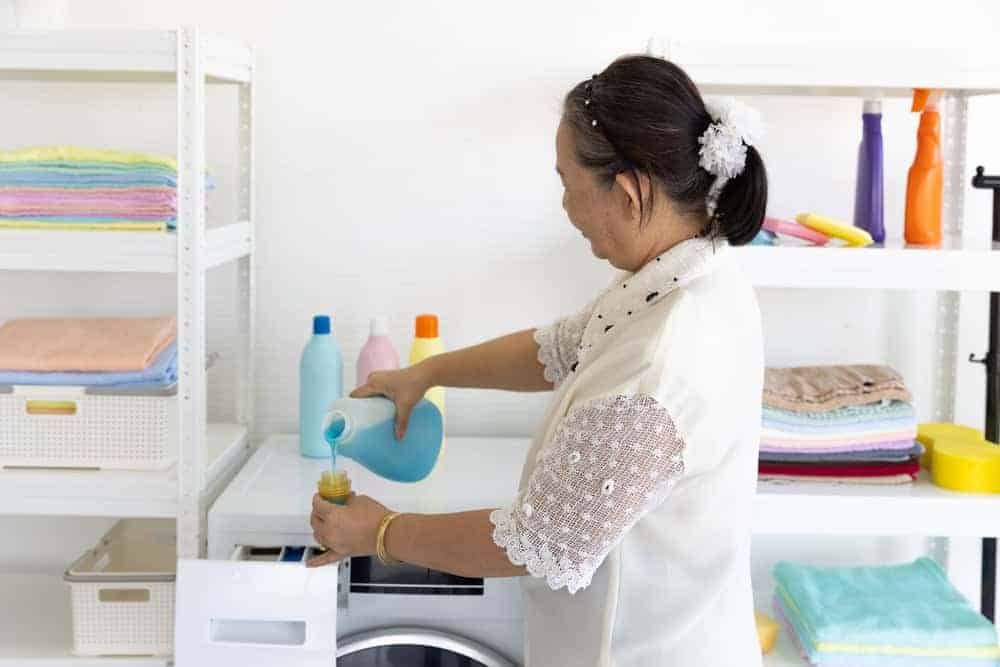
5. Compatibility
Your loved one and the caregiver must get along well. The caregiver should have a personality and style that matches the senior’s needs and preferences.
If your beloved senior has specific cultural or language needs, make sure the caregiver understands and respects them. If the senior doesn’t speak English, prefer a caregiver who speaks their language as this can prove extremely helpful not only in emergencies but also at day-to-day basis.
6. Services Provided
Check if the caregiver can offer the range of services, your aging loved one needs. Be it personal care, companionship, medication help, or medical care, senior’s needs may change over time. Making sure that the provider can meet all the senior’s needs as they change over time is essential.
It is a good idea to choose a provider that offers flexible care plans as those can be adjusted as your loved one’s needs increase or decrease.
7. Cost
Ask about the pricing and how the care provider charges. Is it a daily or hourly rate? Do nighttime care costs differ from daytime care?
Check if the provider accepts insurance, Medicare, Medicaid, or other forms of payment. Some veterans’ benefits may also cover care.
Ask if there are any extra costs, like transportation fees or overtime charges.
8. Care Plan Review
Choose a provider that offers a full assessment of your loved one’s needs before developing a care plan. This way you will have more confidence that the care plan fits their needs.
Moreover, your beloved’s care plan should be reviewed and updated regularly as their condition changes. Make sure this is a part of the service.
9. Emergency Procedures
Do not overlook to ask about the provider’s plans for emergencies, such as falls or sudden health problems. Make sure they are prepared and know how to respond quickly to keep your loved one safe.
Caregivers should be trained in CPR, first aid, and emergency handling. They should also help make a senior’s home safer by identifying potential hazards.
10. Communication Is Key
To stay on top of things, you and your family need to be kept in the loop. Ask if the care provider communicates with family members about the senior’s condition and how regularly. They should be able to provide daily, weekly, or monthly updates.
Some agencies use technology to track care plans, medication schedules, and daily activities. This can help families stay informed about the senior’s care, but you need to ensure you have access to it.
A nice touch is if the provider offers telehealth services so the senior can connect with doctors from home in case medical oversight is needed.
How to Pay for 24-Hour Home Care Services
Caring for a senior loved one with 24 hour home care can be expensive. There are various ways you can pay for these services.

Medicare
Medicare doesn’t pay for 24-hour home care, especially if it’s non-medical care like helping with dressing or bathing.
It covers some medical care, like part-time nursing, wound care, shots, or physical therapy. This applies only for short-term periods, such as a few hours of care daily for up to 60 days.
For seniors with terminal illnesses, Medicare’s hospice program might cover some home care, but it’s mainly for comfort and not around-the-clock caregiving.
Medicaid
Medicaid can help pay for 24-hour care, but this is decided on an individual basis, as doctor’s recommendations and senior’s medical needs are taken into account.
Some states have programs (called Medicaid waivers) that pay for long-term home care, such as personal care or help with daily activities.
Medicaid is for people with low income, so seniors must meet income and asset limits to qualify. Seniors with serious health needs may be eligible for more care through Medicaid.
Long-Term Care Insurance
Long-term care insurance (LTCI) helps pay for services like 24-hour home care, which Medicare doesn’t cover. This includes help with bathing, eating, and even medical care if needed.
You need to buy long-term care insurance before health problems start, usually in your 50s or 60s. The policy may cover a certain amount per day for care, but it might not pay for everything if 24-hour care is needed.
When It Kicks In: Most long-term care policies start paying benefits when the person can’t do a few basic tasks (like dressing or eating) or if they have a condition like dementia.
Other Financing Options
- Out-of-Pocket
Some families pay for 24-hour care on their own. This can be expensive (ranging from $150 to $500 per day), but it allows you to choose the best care for your loved one. Seniors can use their savings, pensions, or retirement accounts to pay for home care.
- Reverse Mortgage
Seniors can use the value of their homes to get money for home care. With a reverse mortgage, the bank gives them money based on the home’s value, and they don’t have to pay it back until the house is sold or they pass away.
- Veterans Benefits:
Veterans and their spouses might qualify for a pension that helps pay for home care if they need help with daily tasks. To qualify, the veteran must have served in the military and meet certain health and income rules.
Those veterans who are mostly homebound because of a disability may get additional help paying for care.
- Using Life Insurance for Care
Some life insurance policies allow seniors to use part of their death benefit early to pay for care.
Another option is selling the life insurance policy for cash, which can then be used to pay for home care.
- Pooling Family Resources
Sometimes, family members chip in to cover the cost of home care. This could be siblings, children, or other relatives working together to help pay for care.
Paying for 24 hour home care requires looking at all your options. Each family must decide what works best based on their finances and care needs.
In Recap
24-hour home care offers seniors continuous care, allowing them to age safely and comfortably at home. From personal care and companionship to skilled nursing and end-of-life care, this service ensures both seniors and their families feel secure and supported.
The key benefits of 24-hour home care for seniors include personalized care, where seniors receive one-on-one attention tailored to their specific needs, ensuring they get the right support.
Staying in the comfort of their own homes, they avoid the stress of moving to a care facility. With constant supervision, the risk of falls, accidents, and medical emergencies is reduced, providing better safety.
This round-the-clock care gives peace of mind to families, knowing their loved ones are being looked after at all times. Additionally, care plans are flexible and can be adjusted as the senior’s condition changes, ensuring they always receive the appropriate level of care.
The benefits of 24 hour home care go beyond medical care, providing emotional support, safety, and personalized attention. Seniors get to maintain their quality of life and independence while staying in a familiar environment.
When selecting 24 hour care, it’s important to think about your loved one’s needs, the caregiver’s qualifications, and the care provider’s reputation. Open communication and personalized care are key to ensuring your loved one is safe and comfortable. With the right provider, you can have peace of mind knowing they are in good hands.
If you are ready to explore home care options, contact Amy’s Eden Senior Care today at (775) 884-3336. You will find that ‘We are family, not just care!




